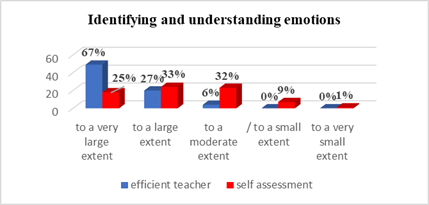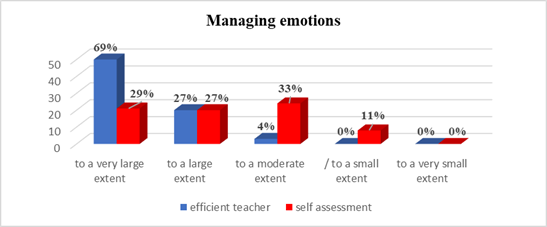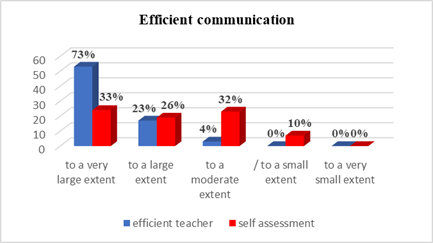Abstract
Teachers play an important role in ensuring quality in education. The need to improve teachers’ competences through an effective initial and continuous training system is an educational policy priority at European and national level. The revival of Romanian contemporary school can be achieved primarily through teachers – not all the teachers, but capable teachers endowed with a full set of professional and transversal competences, which should allow them to assume and properly exert their specific roles. Aware of the decisive role of a teacher’s emotional competences in ensuring the success of the educational process, in an investigative attempt having pre-university teachers as the target-group, we aim to identify the extent to which they relate to these competences as key competences that the quality of the teaching activity depends upon. The results of a questionnaire-based survey enable us to assert that, although teachers exploit, at least at a declarative level, this type of competences, these are rather neglected when it comes to effectively developed educational practices. That is why we believe that the teachers’ “emotional literacy” should represent a goal assumed in psycho-pedagogical training programmes, within the initial and continuous process of instruction for the teaching career.
Keywords: Emotional competencesprofessional competenceseffective teachereffective teachingquality of education
Introduction
According to a recent communication of the European Commission, “making high-quality education a reality for all young people is a key concern for Europe's future” (2017, p. 13). We all aspire to quality education, with the firm conviction that only thus we will be able to ensure a durable society, a better life for all, based on moral principles and values, only thus we will experience the feeling of self-fulfilment, self-realisation and we will know a state of prosperity. But in order to build an educational system in which quality should not be only referential, but a reality that any trainable person may benefit from, we need competent teachers who are dedicated to their profession, aware of the mission they have; we need educators who are conscious of the fact that the didactic profession equates to a constant and continuous investment in one’s own self-training/development, that schools are organisations in which everyone learns, starting even with those who teach…However, teachers with a high level of professional competences are being prepared within an initial and continuous training system in which unity, continuity, coherence, relevance, the optimal articulation among its structural elements are but a few of the specific attributes.
Quality in education requires, first of all, more care, more concern and attention for the quality of training of aspirants to the teaching profession. Due to the many challenges that current Romanian school makes teachers face – diversity in the classroom, early school abandonment, increased functional illiteracy, low family involvement in school life, proliferation of phenomena such as bullying or school violence, simultaneous teaching etc. –, we believe that a teacher’s profile of competences should be complemented with a proper set of emotional competences.
Which are, in our opinion, the didactic qualities and behaviours shown / demonstrated by a teacher who can add some value to the class of students or to education, in general? An effective teacher is that who knows how to associate an affective “nuance” with the content communicated; who knows how to convey not only ideas, thoughts, but also emotions, feelings; who knows how to communicate and interact with students, permanently employing the empathic ability; who can convince students to share their school or personal problems at any time so that together they should identify the adequate solutions; who knows how to solve, mediate the student-student or student-teacher conflicts; who is able to manage their own emotions, constantly being aware of their role as models, of the fact that their attitudes, behaviours and reactions may influence the students’ conduct. The description is far from being complete, but is relevant for highlighting the emotional competences an effective teacher should make use of in their educational work. By investing emotion, passion, feelings in the didactic activity, ever since the first moment of its design, the educator will create the conditions of effective teaching that is “apt” to generate authentic learning, thus putting each pupil in a successful school situation.
Problem Statement
The concern to show that the formation / development of emotional competences should be an objective of teacher training programmes is obvious and studies on this issue have been developing in the last years.
However, the issues that affect the present-day Romanian society, reflected upon school as well, may also weaken the psycho-emotional profile of the teacher. Phenomena such as the occupational stress, exhaustion or burn-out, exacerbated competition that generates interpersonal conflicts, emotional instability etc. are increasingly becoming a part of the autochthonous educational environment and require prompt interventions from us.
Certainly, the initial and continuous teaching training system must integrate didactic components / modules that help “define” a didactic personality profile which should comprise abilities/capacities such as: perception and accurate understanding of emotions; effective management of emotions/emotional self-control; appropriate communication, of emotions as well; motivation for continuous development; empathy; providing constructive feedback; resilience; pedagogical optimism; flexibility; stress resistance; team work; critical thinking; objective self-assessment; conflict mediation and resolution; negotiation; optimal relations with the alterity etc. It is therefore necessary that initial and continuous training should also entail the emotional literacy of aspirants to the teaching position and of those who are already teachers. This process implies providing them with a set of emotional skills that may enable them to be effective not only in transferring information to students, but also in communicating with them, in educational interactions, in conflict management and in the management of their own emotions and behaviours.
According to a study that deals with the results obtained after implementing a pilot programme of training/development of emotional competences of future teachers, “the complex influences that affect the teachers’ sense of commitment, wellbeing and resilience call for a well-designed educational provision to meet the teachers’ learning needs within the area of emotional competence” (Madalinska-Michalak, 2015, p. 90).
Thus,
We have intended to find out whether the teachers in the pre-university education system have learned the lesson of emotions or not. The results of our investigative approach will be further partially dealt with.
Research Questions
The premises of the study were the following questions:
Are the teachers in pre-university education aware of the importance of emotions and their role in the educational process?
Do teachers value the emotional competences and consider them key competences for the didactic profession?
To what extent do teachers consider that they integrated the emotional competences in their own personality profile?
Purpose of the Study
The main objective of the research approach was to identify the extent to which teaching staff in pre-university education are aware of the need to include the emotional competences in the category of the competences which are essential for a successful teacher and to determine the extent to which such competences are part of their didactic personality. In addition, another objective of the study was to highlight the need to complete the initial and continuous training process for the didactic career, and to add modules/subjects focused on the formation/development of the emotional competences.
Research Methods
To conduct the investigative approach we used a questionnaire-based survey and the focus group discussions. The questionnaire used included closed-ended questions; the multiple choices were distributed on a-five-point Likert scale, from
Findings
The main research directions aimed at three competences subsumed to the emotional intelligence (a, b) or decisively influenced by such intelligence (c):
identification and understanding of one’s own emotions as well as the emotions of the students, in different curricular and extracurricular contexts;
the emotion management (positive and negative: control of impulses, anger management, expressing joy, enthusiasm etc);
effective communication (verbal, paraverbal, non-verbal, assertive), team work and decision-making capacity in various situations.
The teachers included in the research sample were requested to reflect on these variables, relating thus to both the competences profile of an effective teacher, and to one’s own didactic personality.
In figure

Figure

The effective communication used to be and still is the key to a successful educational process. Irrespective of how the teacher communicates, verbally, non-verbally, paraverbally, orally or in writing, assertively, etc, he/she does communicate. Even when the teacher remains silent, he/she still communicates. Analysing the responses to the item which concerned this vital skill for a good teacher (Figure

Conclusion
Emotionality is fundamental to creating any interhuman connection and optimal integration in a social context. The educational environment bears the mark of both teachers’ and students’ emotionality, as the teacher-student relation and the student-student relation are created, develop and influence everything that happens at this level. Any teacher who is aware of his/her calling tends to evolve on an ongoing basis, to grow and to be more effective when working with students as there are various challenges for which it is not enough to have sound cognitive, methodological, assessment, managerial competences; it is more important in this case to have appropriately developed emotional competences.
The results of the investigative approach undertaken have enabled us to conclude that, even though the teachers value, at least declaratively, the emotional competences, and they integrate them in the personality/competences profile of the effective teacher, the educational practices actually developed are placed to the background. As a consequence, we consider that the teachers’ “emotional alphabetisation” should represent an objective assumed in relation to psychopedagogical training programmes, both in initial training and in continuous training for the didactic career.
Acknowledgments
The contribution of the authors to this paper is equal.
References
- Bar-On, R., Parker, JD.A. (2011). Manual de Inteligență emoțională [Emotional Intelligence Manual]. București: Curtea Veche.
- European Commission Brussels. (2017). Communication from the Commission to the European Parliament, the Council, the European Economic and Social Committee and the Committee of the Regions. School development and excellent quality of teaching for a good start in life. Retrieved from https://eur-lex.europa.eu/legal-content/RO/TXT/PDF/?uri=CELEX:52017DC0248&from=ro
- Goleman, D. (2007). Inteligenţa emoţională [Emotional Intelligence]. Bucureşti: Curtea Veche.
- Goleman, D. (2008). Inteligenţa emoţională, cheia succesului în viaţă [Emotional Intelligence, the key to success in life]. Bucureşti: Allfa.
- Madalinska-Michalak, J. (2015). Developing Emotional Competence for Teaching. Croatian Journal of Education, 17 (2), 71-97. DOI:
Copyright information

This work is licensed under a Creative Commons Attribution-NonCommercial-NoDerivatives 4.0 International License.
About this article
Publication Date
15 August 2019
Article Doi
eBook ISBN
978-1-80296-066-2
Publisher
Future Academy
Volume
67
Print ISBN (optional)
-
Edition Number
1st Edition
Pages
1-2235
Subjects
Educational strategies,teacher education, educational policy, organization of education, management of education, teacher training
Cite this article as:
Drăghicescu, L., Stăncescu, I., Santi*, E., & Petrescu, A. M. A. (2019). Teachers Emotional Competences - A Conditional Factor Of Effective Teaching. In E. Soare, & C. Langa (Eds.), Education Facing Contemporary World Issues, vol 67. European Proceedings of Social and Behavioural Sciences (pp. 1425-1431). Future Academy. https://doi.org/10.15405/epsbs.2019.08.03.175
